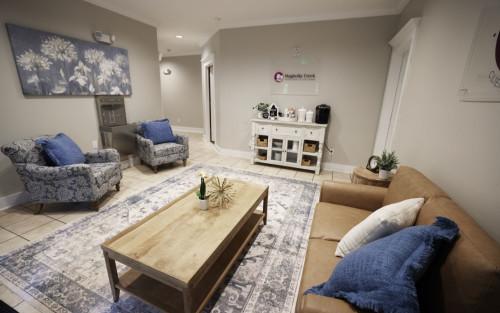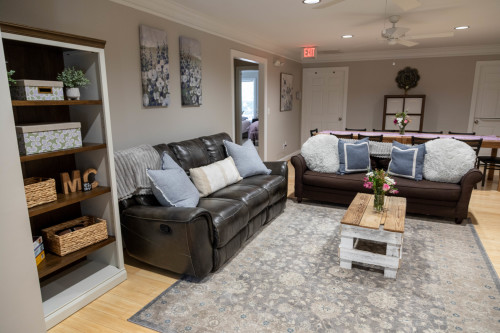






Magnolia Creek
Treatment Focus
You can get treatment for eating disorders at this center, helping you navigate symptoms, build coping tools, and restore your physical health under expert care.
Primary Level of Care
Offering intensive care with 24/7 monitoring, residential treatment is typically 30 days and can cover multiple levels of care. Length can range from 14 to 90 days typically.
Claimed
Recovery.com has connected directly with this treatment provider to validate the information in their profile.
Treatment Focus
You can get treatment for eating disorders at this center, helping you navigate symptoms, build coping tools, and restore your physical health under expert care.
Primary Level of Care
Offering intensive care with 24/7 monitoring, residential treatment is typically 30 days and can cover multiple levels of care. Length can range from 14 to 90 days typically.
Provider's Policy
Magnolia Creek accepts most major medical/behavioral health insurances and treatment rates vary based on the level of care.
Magnolia Creek
Magnolia Creek
About Magnolia Creek
Magnolia Creek is a women's only residential treatment center that specializes in treating women and teen girls with anorexia nervosa, bulimia nervosa, binge eating disorder, compulsive exercise disorder, pica disorder, muscle dysmorphia, and purging disorder, along with co-occurring health conditions. Magnolia Creek offers a full continuum of care with individualized treatment plans tailored to the individual. They blend evidence-based intervention with holistic therapies. The residential program length is 30 days. Each day, clients participate in individual therapy, group therapy, and experiential and recreational therapy. Therapies vary from day to day and can include CBT, DBT, ACT, mindfulness therapy, motivational interviewing (MI), and family counseling. Clients will have the opportunity to participate in experiential therapies like animal-assisted therapy, wilderness therapy, art therapy, sand-tray therapy, music therapy, and adventure therapy. After residential treatment, clients step down onto a Day Treatment, or PHP. Rather than living at the treatment center, clients attend daily programming and are provided the opportunity to prepare meals and engage in learned coping skills at home in the evenings. In addition to treatment, Magnolia Creek offers a 3-day intensive family program once a month and an ongoing aftercare program.
Magnolia Creek sits in a quiet and picturesque setting in Columbiana, Alabama, about an hour southeast of Birmingham. The beautiful property is surrounded by 40 acres of wooded land with a large private lake. The colonial home houses up to 14 residents and provides comfortable accommodations, a living room fireplace, and a wraparound porch perfect for relaxing. Clients are served 3 meals a day prepared by an on-site chef. Clients can enjoy walks through the beautiful property, yoga, and horseback riding. Magnolia Creek is accredited by the Joint Commission and accepts most private insurance.

Center Overview
Treatment Focus
You can get treatment for eating disorders at this center, helping you navigate symptoms, build coping tools, and restore your physical health under expert care.
Joint Commission Accredited
The Joint Commission accreditation is a voluntary, objective process that evaluates and accredits healthcare organizations (like treatment centers) based on performance standards designed to improve quality and safety for patients. To be accredited means the treatment center has been found to meet the Commission's standards for quality and safety in patient care.

Insurance Accepted
Cash Pay Rates
Estimated Cash Pay Rate
Center pricing can vary based on program and length of stay. Contact the center for more information. Recovery.com strives for price transparency so you can make an informed decision.
Meet Your Care Team

Lindsay Curlee
Executive Director

Dr. Danielle Hagood
Clinical Director

Misty Griffin
Director of Nursing
MEd, RN

Leigh-Ann Bamberg
Director of Nutrition Services
MS, RDN, LD, CEDS-S
Levels of Care





Your Care Options
Specializations
Adolescents
Teens receive the treatment they need for mental health disorders and addiction, with the added support of educational and vocational services.
Eating Disorders
An eating disorder is a long-term pattern of unhealthy behavior relating to food. Most people with eating disorders have a distorted self-image.
Who We Treat
Adolescents
Teens receive the treatment they need for mental health disorders and addiction, with the added support of educational and vocational services.
Women only
Women attend treatment in a gender-specific facility, with treatment delivered in a safe, nourishing, and supportive environment for greater comfort.
Approaches
Spiritual Emphasis
Spirituality connects patients to a higher power and helps strengthen their recovery, hope, and compliance with other treatment modalities.
Evidence-Based
A combination of scientifically rooted therapies and treatments make up evidence-based care, defined by their measured and proven results.
Individual Treatment
Individual care meets the needs of each patient, using personalized treatment to provide them the most relevant care and greatest chance of success.
Twelve Step
Incorporating spirituality, community, and responsibility, 12-Step philosophies prioritize the guidance of a Higher Power and a continuation of 12-Step practices.
Gender-Specific
Separate treatment for men or women can create strong peer connections and remove barriers related to trauma, shame, and gender-specific nuances.
Therapies
Meditation & Mindfulness
A practiced state of mind that brings patients to the present. It allows them to become fully aware of themselves, their feelings, and the present moment.
Art Therapy
Visual art invites patients to examine the emotions within their work, focusing on the process of creativity and its gentle therapeutic power.
Equine Therapy
Guided interactions with trained horses, their handler, and a therapist can help patients improve their self-esteem, trust, empathy, and social skills.
Experiential Therapy
With this approach, patients heal by doing. Therapists help patients process difficult emotions to speak, using guided activities like art or dance.
Eye Movement Therapy (EMDR)
Lateral, guided eye movements help reduce the emotional reactions of retelling and reprocessing trauma, allowing intense feelings to dissipate.
Family Therapy
Family therapy addresses group dynamics within a family system, with a focus on improving communication and interrupting unhealthy relationship patterns.
Motivational Interviewing and Enhancement Therapy (MET)
This approach is based on idea that motivation to change comes from within. Providers use a conversational framework that may help you commit to recovery.
Narrative Therapy
Through narrative therapy, patients rewrite past events with a positive focus. They separate themselves from the problem to see their purpose and capabilities.
Acceptance and Commitment Therapy (ACT)
This cognitive behavioral therapy teaches patients to accept challenging feelings and make the appropriate changes to reach personal goals.
Conditions We Treat
Personality Disorders
Personality disorders destabilize the way a person thinks, feels, and behaves. If untreated, they can undermine relationships and lead to severe distress.
Anxiety
Anxiety is a common mental health condition that can include excessive worry, panic attacks, physical tension, and increased blood pressure.
Depression
Symptoms of depression may include fatigue, a sense of numbness, and loss of interest in activities. This condition can range from mild to severe.
Eating Disorders
An eating disorder is a long-term pattern of unhealthy behavior relating to food. Most people with eating disorders have a distorted self-image.
Self-Harm
The act of intentionally harming oneself, also called self-injury, is associated with mental health issues like depression.
Trauma
Some traumatic events are so disturbing that they cause long-term mental health problems. Those ongoing issues can also be referred to as "trauma."
Substances We Treat
Co-Occurring Disorders
A person with multiple mental health diagnoses, such as addiction and depression, has co-occurring disorders also called dual diagnosis.
Languages
Aftercare
Care Designed for Your Needs
Personal Amenities
Amenities
Special Considerations
Flexible technology policies
Centers with flexible technology policies allow professionals to stay in touch with work and give patients a greater sense of connection and normalcy.
Gender-specific groups
Patients in gender-specific groups gain the opportunity to discuss challenges unique to their gender in a comfortable, safe setting conducive to healing.
Activities

What people are saying
Treatment
3.9
Accommodations
4.4
Food & Nutrition
4.0
Value
4.1
Kimberly
Reviewed 09/19/19
Review from Rehabs.com
Lynn
Reviewed 11/18/19
Review from Rehabs.com
BB
Reviewed 06/02/18
Review from Rehabs.com
EF
Reviewed 10/01/17
Review from Rehabs.com
MC
Reviewed 09/13/17
Review from Rehabs.com





